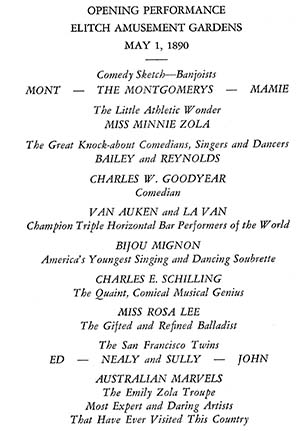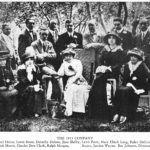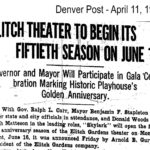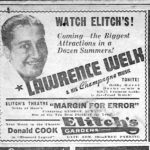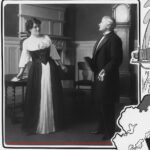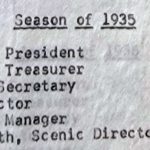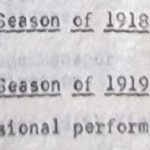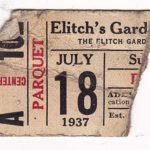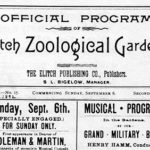In 1896, the second stock season was a slight roller coaster ride with a positive ending. It was described concisely as follows:
In 1896, Mrs. Elitch signed J. H. Huntley to direct a resident stock company, headed by Jennie Kennark (who had been leading actress at Manhattan Beach the previous season) in a series of popular melodramas. The season opened with Rosedale, a Lester Wallack success. After six weeks of melodrama, however, and a few unsatisfactory notices, the organization of the company was changed. Huntley, who was not very popular with audiences or with newspaper reviewers, was replaced by Walter Edwards, leading man at Manhattan Beach in 1895. Since there had been criticism against the type of plays being offered, the plays under the direction of Edwards were lighter – more comedy-drama and comedy and less melodrama.
Huntley left the company on July 11,1896. Walter Edwards became director on July 12,1896. Theatergoers and drama critics approved of the change to Edwards and of the new play selections. The first play directed by Edwards was J. K. Tillotson’s A Gilded Crime. The newspaper review carried the following comment:
A Gilded Crime seemed to please the audiences greatly … Walter Edwards’ presence has strengthened the company materially…
Maude Fealy, who was to become a well-known Denver actress, made her debut in the Theatre during this season, playing children’s roles. She first appeared during the week of July 19th in Henry C. De Mille’s The Lost Paradise.
Among the many other plays presented during the season were Richard Blanchard’s The Galley Slave, William Haworth’s Ferncliff and Steele MacKaye‘s Hazel Kirke. Hazel Kirke was written in 1880 and was “among the very first plays to send out road companies, five of them touring while the original production remained in New York.
[Borrillo, Theodore A. Denver’s Historic Elitch Theatre: A nostalgic journey, 2012. ISBN 978-0-9744331-4-1. OCLC 823177622. p. 29]
Theatre Staff:
- Mrs. John Elitch, Jr., Proprietor and Manager
- J. H. Huntley, Stage Director
- Walter Edwards, Stage Director (beginning July 12)
Resident Company:
- Jennie Kennark
- Maude Fealy
- Margaret Fealy
- Isis Maynard
- Jessaline Rogers
- Theresa Milford
- Lettie Allen
- Louise Ripley
- Fannie Grant
- Helen Harrison
- Dora Wentworth
- Jessie Izett
- J. H. Huntley
- Walter Edwards
- Frederick Bock
- Harry Glazier
- Harry Adams
- E. F. Kreyer
- Max Von Mitzel
- Frederick Montague
- Gus Weinberg
- Hugh J. Ward,
- Theodore Brown
- Harry Morris
Productions:
- Week of May 30: Rosedele, by Lester Wallack (1863).
- Week of June 7: Pink Dominoes, by Augustin Daly (1877)
- Week of June 14: Queena, by J.K. Tillotson (1884)
- Week of June 21: Hazel Kirke, by Steele Mackaye (1880)
- Week of June 28: The Golden Giant Mine by Clay M. Green (1880)
- Week of July 5: The Galley Slave, by Richard Blanchard (1871).
- Week of July 12: A Gilded Crime, by J. K. Tillotson.
- Week of July 19: Lost Paradise, by Henry C. DeMille (1891) Maude Fealy‘s debut at Elitch’s Gardens.
- Week of July 26: Woman Against Woman, by Frank Harvey (1884).
- Week of Aug. 2: The Planter’s wife, by J. K. Tillotson (1882).
- Week of Aug. 9: Moths, by Helen Adeli (1883).
- Week of Aug. 16: Ferncliff, by William Haworth (1884).
- Week of Aug. 23: Still Waters Run Deep, by Tom Taylor (1884).
- Week of Aug. 30: East Lynne, by Mrs. Henry Wood and Clifton Tayulure (1867).
- Week of Sept. 6: Lost Paradise, by Henry C. DeMille (1891).
- Week of Sept. 13: Schilling’s Minstrels, featuring the La Rose Brothers, acrobats; Ray Southard, comedian; Jack Sample, comedian; Trocadero Quartette; Crandall and Clark, musical team; John Starr; Gorman and Fields, comedians; Charlie Lomier, vocalist; Steve Prideau, dancer: Master Joe Harkins.
- Week of Sept. 27: Benefit for Charles Goodyear. Margaret Fealy and Theodore Brown; Maude Fealy, Lottie Sandford; Mark Swain; Harry Dan; John Brace; Southern Quartette; Joe Newman; the drama, The Outcast, with A. W. Fremont, Theodore Brown, Robert Morris, Charles Mason, Jessie Izett.
